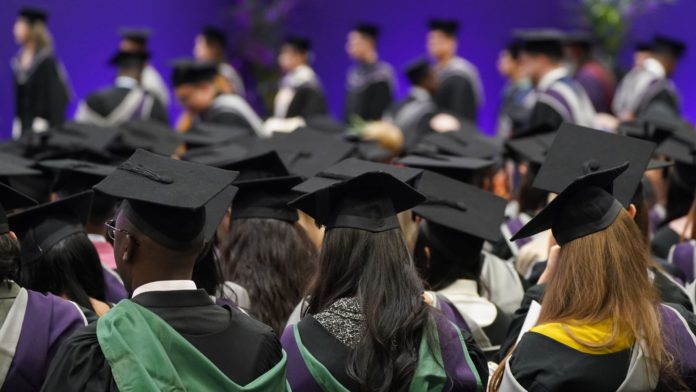James Cleverly has said the “unreasonable practice” of overseas students bringing their family to the UK will end as restrictions on visa routes come into force on Monday.
The Home Secretary said the ban, which affects all but those enrolling on postgraduate research courses and ones with Government-funded scholarships, will cut migration by tens of thousands.
The measures were announced in May by his ousted predecessor Suella Braverman shortly before official figures showed net migration running at 672,000.
The move could hit universities which rely on foreign student fees and could also harm the UK’s reputation as an international destination, experts have warned.
It means that as of Monday, international students starting courses in Britain are no longer allowed to obtain visas for their dependents, unless they are on a postgraduate research programme or a Government-sponsored course.
Prime Minister Rishi Sunak tweeted: “From today, the majority of foreign university students cannot bring family members to the UK.”
The Conservative Party leader said the announcement showed that the Government was “already delivering for the British people” in 2024.
Mr Cleverly said: “This Government is delivering on its commitment to the British public to cut migration. We have set out a tough plan to rapidly bring numbers down, control our borders and prevent people from manipulating our immigration system, which will come into force throughout this year.
“Today, a major part of that plan comes into effect, ending the unreasonable practice of overseas students bringing their family members to the UK. This will see migration falling rapidly by the tens of thousands and contribute to our overall strategy to prevent 300,000 people from coming to the UK.”
Immigration minister Tom Pursglove said: “Our world-leading universities rightly attract some of the brightest students from around the world to the UK.
“But we have seen a surge in the number of dependants being brought by students, which is contributing to unsustainable levels of migration.”
Revised Office for National Statistic (ONS) figures released last month showed net migration ran at a record figure of 745,000 in the year to December 2022. It stood at a provisional 672,000 in the year to June 2023.
Earlier in December, Mr Cleverly set out a raft of new restrictions that he said would cut numbers by 300,000 a year, including hiking the salary threshold for Britons bringing foreign spouses to the UK to £38,700.
The move was criticised for threatening to tear families apart, with many having their future thrown into doubt as the Government considered the details of the policy.
Ministers later rowed back by quietly announcing the threshold would first be raised to £29,000 and then increased in “incremental stages” until spring 2025, which in turn angered MPs on the Tory right in favour of tighter migration controls.
The Home Office said the new package is a “tough but fair” approach, insisting the changes to student visas strike the right balance between “attracting the brightest and best” to Britain but “removing the ability for institutions to undermine the UK’s reputation by selling immigration not education.”
Experts have previously expressed concern about the measure.
Nick Hillman, director of the Higher Education Policy Institute (Hepi) think tank, said international students will go to competitor nations if they are discouraged from coming to the UK.
“As a country, we risk cutting off our nose to spite our face,” he warned.
“International students benefit the UK in all sorts of ways. For example, they are vital to maintaining our world-class university sector as their fees cross-subsidise the teaching of home students and also help to fund UK research.
“I don’t celebrate the new changes and I urge ministers to keep a close eye on competitor nations, who may now seek to recruit those people who would otherwise have come here and benefited the whole of our country.”
Labour has backed the restrictions but said they do not go far enough to tackle “deep failures” in skills and training across the UK labour market or boost the country’s sluggish economy.
“Labour supports these restrictions on dependents for overseas students on shorter courses. However, this is nothing more than a sticking plaster,” shadow home secretary Yvette Cooper said.


